‘An election that we’ve never seen before’: Adrian Schrinner on the unique battle for Lord Mayor
The battle for Brisbane is shaping as an unprecedented showdown with the future liveability of the city on the line.
QWeekend
Don't miss out on the headlines from QWeekend. Followed categories will be added to My News.
Not so long ago, a television journalist reporting on a new council playground in Brisbane asked a little girl what she thought of it.
She looked around with the seasoned eye of a playground connoisseur and answered: “I’d give it about a four out of five.”
From his office in Brisbane’s City Hall, Lord Mayor Adrian Schrinner laughs. “The reporter didn’t realise it was my daughter Octavia he was vox popping. I had to have a talk with her afterwards and say ‘this is a five, Occie’.”
Since their father took office in April 2019, all four of the Schrinner children have seen their fair share of playgrounds – also ribbon cuttings, civic receptions, multicultural celebrations, sausage sizzles and charity events.
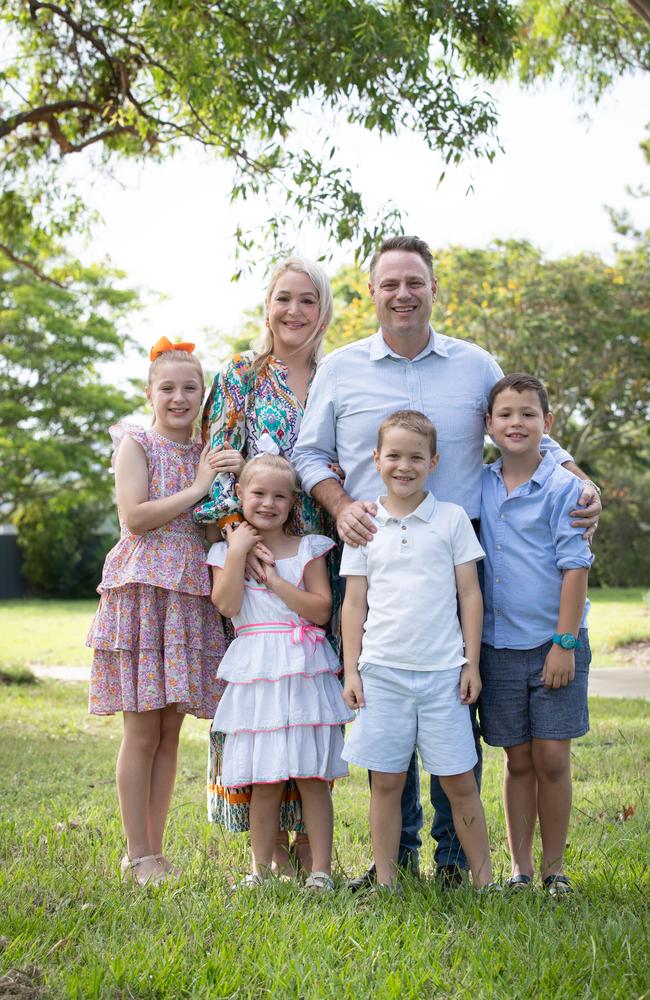
For the Schrinners, Adrian, 46, and wife and Lady Mayoress Nina, 42, who live in Carindale, the office of Lord Mayor is somewhat of a family affair. It was a decision the couple say they made when the LNP’s Schrinner first climbed City Hall’s Italianate marble staircase to become our city’s 17th Lord Mayor in 2019.
Their children were small (the youngest, Petra, was still in nappies) and while the role is largely focused on the business of council – directing the chief executive, delivering the budget, developing and implementing policy, and managing the so-called big three Rs of local politics: roads, rates and rubbish – it also has a civic and ceremonial component. And those particular duties are often carried out in “off-duty” hours.
“It was about us spending time together,” Schrinner says. “Because if I took the attitude that ‘In this role, I do it, and we won’t do it together’, I would never see Nina and I would never see my kids. That’s not an option.”
Instead, the good people of Brisbane have become accustomed to seeing the entire tribe turn up to events, as the Lord Mayor says, “piling out of a van, and kids coming out left, right and centre”.
They’ve also seen the Schrinner kids grow up during their father’s tenure. When Qweekend first photographed the family at City Hall in May 2019, it was a little like herding cats; a tumble of toddlers pushing toy cars and peeping out from under the Lord Mayoral desk. Now Octavia is 11, Wolfgang, 9, Monash, 7, and Petra, 6.
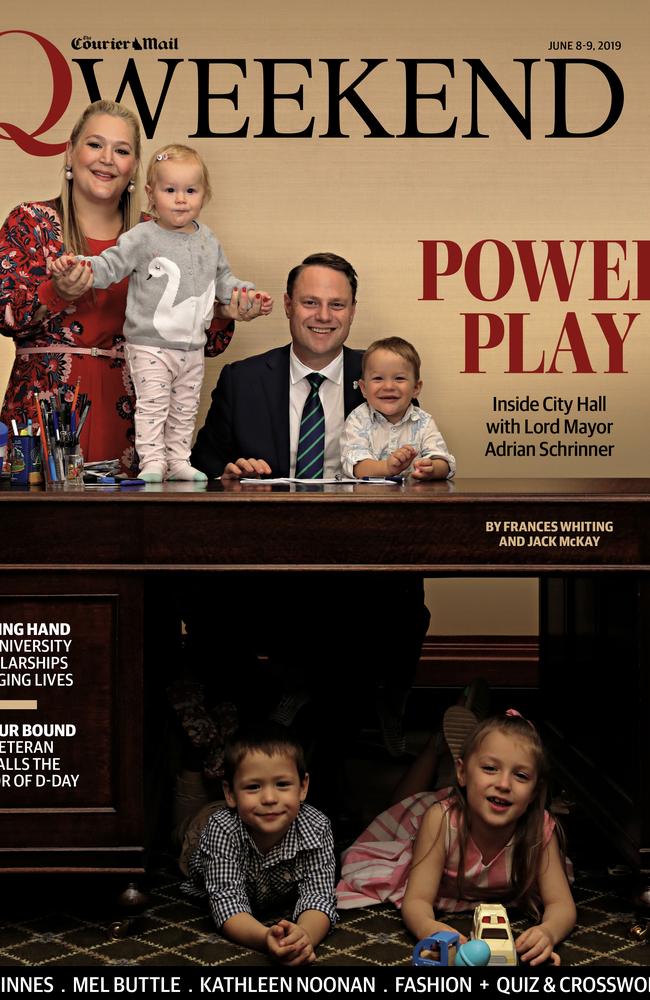
Their father, too, has well and truly grown into the role he first apprenticed for as Graham Quirk’s deputy mayor for eight years.
Five years into the top job, and having faced the global Covid pandemic just months into his tenure, followed by the catastrophic Brisbane floods of 2022, and Brisbane’s selection as the 2032 Olympic City (more on that later) Schrinner wants to keep it.
Aiming for a second term, Schrinner will face off against Labor’s Tracey Price and the Greens Jonathan Sriranganathan in the March 16 local government elections.
In a political landscape that’s also changed since he came into office, it will be a fight, he says, like no other.
“Have you seen an election where there are three main contenders for Lord Mayor? You’ve seen that shift now away from two main parties to three parties.
“If anyone ever says to me, ‘How are you feeling? You’re feeling confident?’, I’m like, ‘No, no, this is a real fight’ and it will be like an election that we’ve never seen before.”
Whether he is right or not in this summation (and politicians from all sides have a long history and habit of downplaying their chances) remains to be seen.
In the meantime, he’s hoping the LNP has done enough to secure the confidence of its Brisbane voters, reflecting a little on the past five years with an eye to the future, and not making – which may seem counterintuitive at election time – any big promises for the city that, during his tenure, has become the fastest-growing in Australia.
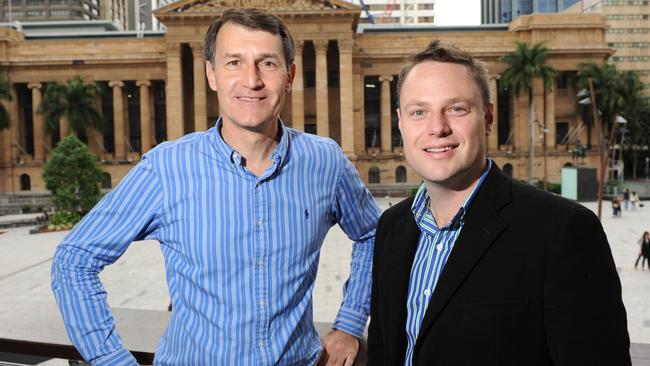
“I was out doorknocking yesterday, and a pharmacist in Mitchelton told me people are skipping medications for cost reasons,” Schrinner says.
“These are challenging times, and now is not the time for big-spending election promises. We have to be very mindful of how we spend, if it means passing costs on to ratepayers.
“The best thing the Brisbane City Council can do now is to keep the downward pressure on rates, to have the financial discipline of not spending more than we have. People are used to all sides making big promises come election time; ours are more modest and affordable, we’re making sure of what we need within a budget.”
What they will spend money on, Schrinner says, is continuing to build and upgrade roads, crime prevention, and investment in lifestyle spaces like the Howard Smith Wharves and the city’s parks.
He believes what will count at the ballot box come March 16, is “the things that people deal with on a daily basis, so the cost of living is a daily thing. Traffic and congestion is a daily thing, and now increasingly, we’re seeing crime at the front of people’s minds, and it’s tragic.
“It shouldn’t be this way, and this is not the Brisbane that I remember growing up. There’s got to be a bigger focus on dealing with crime, and I think that is really something that the community is crying out for action on.”
It’s worth noting that at the time of writing, Police Commissioner Katarina Carroll announced she would be stepping down from the role early, with the decision at least partly attributed by many to the increasingly heated debate around escalating youth crime.
Schrinner also has his eye on our city streets, saying, “when it comes to traffic, this election is interesting because there’s far more radical differences in approach this time”.
He’s referring, in part, to his claim that both Labor and the Greens will push for environmentally friendly options over conventional vehicle usage – at a cost to individual choice.
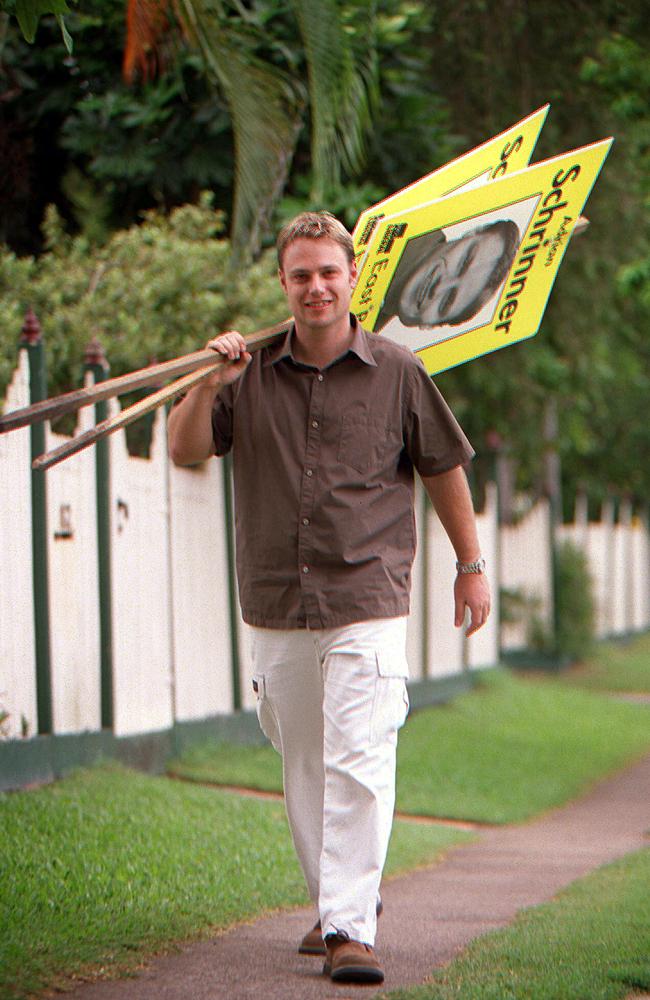
“They really want to see no more investment in road upgrades, which would effectively slow traffic down, which then forces people to get on their bike or to take public transport. I’ve never been a supporter of forcing people into a particular mode of travel,” he says.
“In my view, the radical change of direction being proposed by the other two candidates would actually send Brisbane backwards. It would be counter-productive. It would drive up congestion. It would drive up rates.
“There’s a whole heap of challenges with what they’re proposing. But it’s really, do you want to keep Brisbane moving in the same direction, moving forward, or do you want a radical and really quite extreme change of direction? That’s really the choice.”
He says the Greens, who won three Brisbane-based seats in the last federal election, have yet to prove themselves in office.
“I don’t think anyone who’s serious about looking at the situation could not say that the Greens have a real chance going forward at all levels of government, because they do, but the difference is, up until this point, they’ve tended to be a party that is against things, that is a party of protest, that wants to stop things from happening,” Schrinner says.
“The question in a lot of people’s minds is, can they transition into a party that actually is a party of government that does things rather than being against things? But in the end, all these things will be decided by other people. I will not speculate on what the outcome will be.”
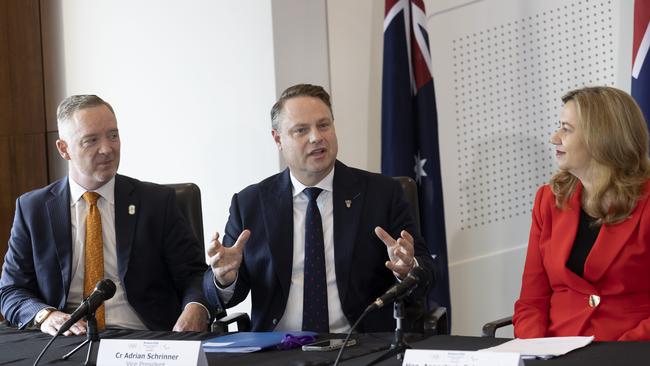
He won’t speculate either, on a new centrepiece venue for the 2032 Olympics, now that the controversial state government plan for the $2.7bn Gabba upgrade has been all but scuppered due, in part, to Schrinner’s own about-face on it.
After initially supporting then-premier Annastacia Palaszczuk’s Gabba proposal, in December Schrinner resigned from the Olympic And Paralympic Games Intergovernmental Leaders Forum, labelling it a “pointless talkfest”.
It was a pivotal moment in his tenure and a decision he now says was one of the hardest of his career.
“We worked really closely with the (then) Premier, and we had built up a good relationship … I like Annastacia, we got on well, and we were both determined to work together despite political or party differences. And it started off really well, and that lasted for a period of time.
“But then that started to change, and we saw a lot of the decision-making just being made within the state government and other stakeholders not being involved … it got to the point where I felt that I had to stand up, because the Olympics was supposed to be about better transport infrastructure, connectivity for South East Queensland, better roads and transport, and then it became mainly about one stadium.”
His resignation swiftly followed the state’s announcement it would redevelop the
Brisbane RNA Showgrounds into a $137m stadium, to host the AFL and cricket, while the Gabba was being redeveloped. It was a decision, Schrinner said at the time, he was kept in the dark about.
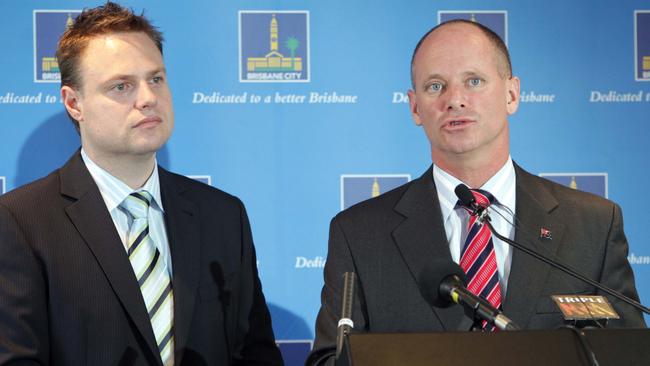
He says then-sports minister Stirling Hinchliffe only attempted to call him late in the afternoon the day before the announcement. And while he says it was a particularly tough decision to resign from the Forum, it didn’t stop him from posting a cheeky screenshot on X.
Beneath a photo of a missed call from Hinchliffe the day before the government announced the RNA decision, he tweeted: “When you miss a call late in the afternoon and don’t know what it’s about …”
It shows a mischievous side to the Lord Mayor, who, no matter what decision he makes, can count on one person being by his side – Nina Schrinner, who many people call his “secret weapon”.
“Oh, it’s no secret at all,” Schrinner laughs, adding that one of the joys of his role over the past five years has been watching his wife of 17 years grow into hers.
Every Lady Mayoress performs the role differently from the highly visible – think Lisa Newman famously and controversially moving her desk next to her husband’s in the lord mayoral office – to the decidedly low-key Anne Quirk.
The current titleholder falls somewhere in between. Engaging and warm, the Lady Mayoress – now a polished public speaker – says it took her some time to grow into the role.
“I had crippling shyness,” she says. “A great fear of offending someone, saying something wrong, or not living up to people who had put trust in me to talk at their event … not doing what they had wanted or hoped.
“It was actually Adrian who said something to me (that helped). He said, ‘but you’re not a politician, you are a full-time volunteer – people will understand that’.”
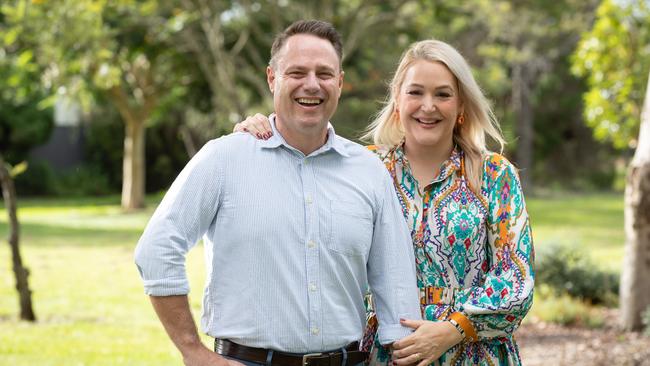
Nina Schrinner may not be a politician, but she is an effective communicator and fundraiser. Since her tenure, the Lord Mayor’s Charitable Trust (she is chair) has distributed $4.5m to more than 200 charities.
Patron to quite a few charities, Forgotten Women, Small Steps for Hannah, and the Carers Foundation are three she is particularly passionate about. And when she speaks at events for those, she speaks from the heart.
“I don’t use notes, and perhaps I share anecdotes that perhaps other people wouldn’t share, and yes there are times when you sit down and you feel very awkward but …”
But it works – having seen Nina Schrinner in action on many occasions, it’s impressive how her words translate into hands in pockets. And while she does indeed speak from the heart, beneath the emotion is due diligence.
The Lady Mayoress makes sure she knows her stuff before she speaks, because she also knows that while her role is apolitical, a step wrong and it’s front page news.
Both Schrinners have become accustomed to the public scrutiny that leading the city council brings. Also the public attention. The constant stopping in the street. The disgruntled voter wanting to talk about their drainage problems.
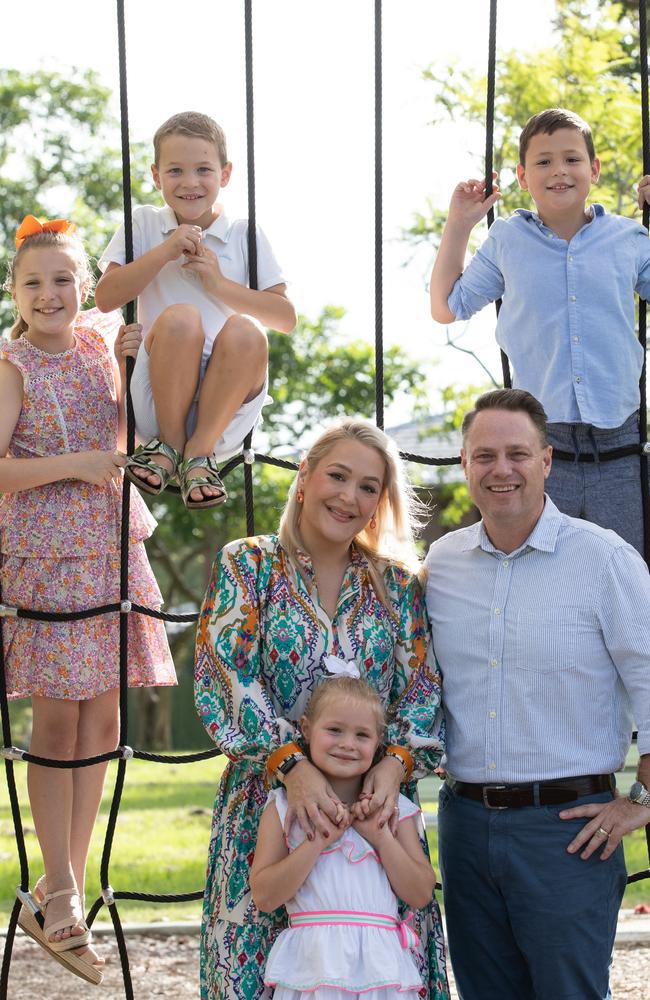
The ones that want to have a go, the ones that want to say “well done”, and the ones that just want to say hello.
Brisbane is a city that wants to know its Lord Mayor, and it’s not shy about starting conversation.
“Nina and I and the kids were at Coles at Rochedale the other day,” Schrinner says, “and we were just going through the checkout and the people behind us go, ‘That was the right decision on the Olympics’, and the people next to them heard this and they joined the conversation as well, and then the cashier joined the conversation.” He laughs.
“But that’s Brisbane.”
It’s a city he clearly loves, and one he hopes to keep leading – Nina Schrinner by his side, kids growing taller and older, and the familiar four-note chimes of the City Hall clock keeping time, keeping watch, nearby.




